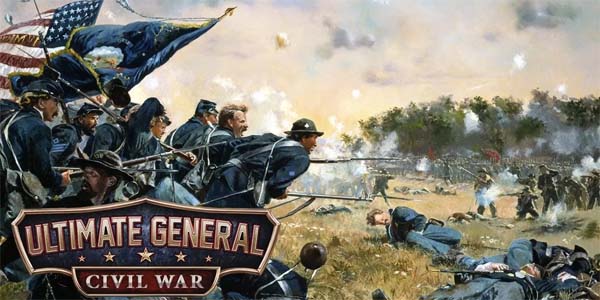

I've asked on numerous occasion for Creative Assembly to build a Total War game based on the American Civil War. I thought for sure that Total War: Shogun 2's second expansion Fall of the Samurai -- with its focus on industrialization, trains, telegraphs, gatling guns, and ironclads -- was setting the series up for a Civil War game. Sadly, that wasn't the case. Creative Assembly decided to move onto Rome II, then to Attila, before diving into all-out fantasy with -- not one, but two -- Total War: Warhammer games!
I've heard that the Total War: Warhammer games are actually pretty awesome, but I have zero interest in Warhammer, so I skipped them entirely. I'll admit that part of that was also because I was a bit bitter that I still hadn't gotten the Total War: Civil War game that I had wanted. Maybe Creative Assembly, being a studio based in the U.K. simply isn't that interested in the American Civil War? Or maybe they felt that Empire's American Revolution campaign already focused enough on the United States?
Addressing Gettysburg
But even though Creative Assembly isn't giving my that game [yet], there's no shortage of Civil War games from other developers. A few years ago, a little indie dev studio called Game Labs released one such game on Steam: Ultimate General: Gettysburg. It was a $15 budget title exclusively about the battle of Gettysburg. Not the entire Civil War, not battles surrounding or related to Gettysburg. Just Gettysburg. The game was praised for its simple UI, its historic details, and realistic, competitive, and highly-customizable A.I..
I played the game very briefly last year, but never actually finished the single battle provided, nor felt that the game was substantive enough (or that I had played enough of it) to warrant a full review. I was fairly impressed with the difficulty and challenge that the game provided, as well as the way in which it presented the actual history of the battle, while still leaving many individual tactical decisions up to the player.
If I had any complaints with that game, it probably only would have been that its narrow scope made it feel a bit overpriced at $15. I had bought it during a sale, so I didn't feel cheated, but I could easily see other people being upset by paying $15 for (basically) a tech demo of a single battle. $10 or less probably would have been the sweet spot.
Well, it turns out that Ultimate General: Gettysburg was basically a tech demo (and a financing plan) for Game Labs' larger, more ambitious project: Ultimate General: Civil War. The new game's scope encompasses the entire Civil War and includes a full campaign. It also sports a cleaner interface that clearly displays your objectives, better controls, and other improvements.
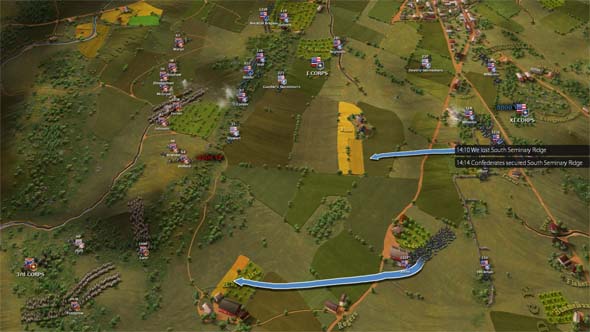
UG: Gettysburg labeled historical points of interest on the map.
When it says, "Fall back to Seminary Ridge", you know exactly where that place is.
Oddly enough, UG: Civil War isn't a strict upgrade from UG: Gettysburg. There's a few features from UG: Gettysburg that have strangely been removed. The original Gettysburg game had some very pretty battlefield artwork that displayed the names of the various locations on the map. Hills, ridges, forests, and even some individual buildings and roads were all labeled with their real-life names! McPherson's Ranch, Culp Hill, Cemetery Ridge, and more are all here. It was an excellent way of providing a sense of place to the player, as well as some historic context. Sadly that feature has been removed from the full Civil War game. I wonder if the developer just didn't have the time or resources to research that level of detail for every battle included. Or maybe it's just because the smaller skirmish sites of battles like Bull Run, Shiloh, and Antietam aren't as infamous as the sites in Gettysburg? Or maybe there were licensing issues with some of the sites, and they decided that if they couldn't include some names, then they'd rather just not include any?

The maps of UG: Gettysburg also had a stylized, polished look to them, the movement arrows were bigger and stood out more (and they stayed on screen to remind you of where the units were headed, and to give the game a textbook-like appearance), elevation and line-of-sight were a bit easier to determine, and so on. This isn't to say that UG: Civil War is a particularly ugly game to look at. If you can get past the simplistic unit sprites, then the game still looks fine. It's just that UG: Gettyburg looked noticeably better!
A House Divided Against Itself...
The campaign of Ultimate General: Civil War will take the player through most of the major battles of the American Civil War. Not just Gettysburg. It also includes some optional smaller skirmishes and situations. In between battles, you'll be tasked with spending money and character prestige to replenish your troops, recruit new and larger regiments, equip your troops with better weapons, and assigning officers to command your corps and divisions. As you win battles, you'll be awarded experience levels that you can spend to upgrade your custom general in several different categories. Upgrading your economy skill will lower the cost of troops and provisions. Increasing your organization skill will increase the size of your army. Increasing your training skill will improve the fighting ability of your regiments. And so on... [More]
de07826a-dae3-41e8-b22b-a5b0f850dc64|0|.0
Tags:Ultimate General, Civil War, Ultimate General: Civil War, Ultimate General: Gettysburg, United States, Union, Confederate States of America, Confederacy, Shiloh, Bull Run, Manassas, Gettysburg, indie gaming, Steam, history, strategy, AI, infantry, cavalry, artillery, skirmisher
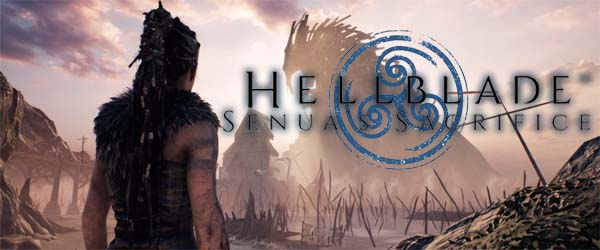
Ninja Theory is a developer that doesn't have very much work under their belt, but the work that they have done has type-cast them into a very specific niche of games. They got their start with the PS3-exclusive Heavenly Sword, and then went on to develop the rebooted DMC (Devil May Cry). So they specialize in stylish, fast-paced, thumb-blistering action games. Hellblade: Senua's Sacrifice is a bit different though. It still has plenty of hacking and slashing, but it's a much slower, more cerebral experience, and it's Ninja Theory's first game that seems to really be about something.
Death, love, and psychosis
One of the principle gimmicks of the game is its perma-death feature. Early in the game, Senua is afflicted by a black rot on her arm. Each time she dies, the rot grows, and if it reaches her head, then she is lost to the abyss. At that point, the game is over, and your save file is deleted. It's similar to the concept of hollowing in Dark Souls, except this time, the game is very upfront and explicit in informing you that it can put a premature end to your adventure.
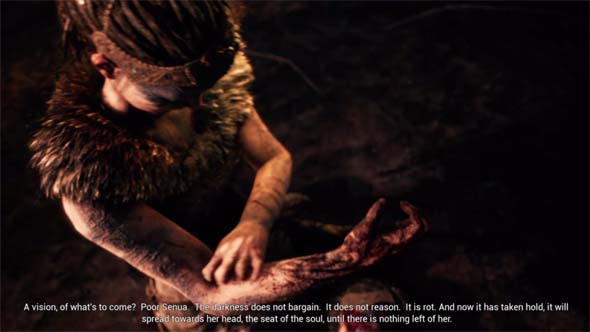
Out damned rot! Out, I say!
Each time you die, the rot grows. If it reaches your brain, it's game over, and your save file is deleted.
This upfront threat puts significant ludic pressure on the player to take Senua's life seriously and to play cautiously and defensively. Not only do you lose some small amount of progress when you die; you may lose all your progress if you are repeatedly sloppy. Ninja Theory isn't completely cruel though. As I progressed through the game, it became apparent that this mechanic is surprisingly forgiving. And if you want to know just how forgiving I think it is, then you can check out the super-duper-secret spoiler section at the bottom of this review. Early in the game, I started to suspect that the rot does not seem to progress if you die repeatedly to the same enemy or trap, so repeat deaths at the hands of a single particularly challenging encounter will not unfairly end your game. In fact, dying in boss encounters didn't seem to progress the rot at all! The combat difficulty is also set to automatically adjust itself by default. So if the waves of enemies become overwhelming for the player, the game will automatically scale them back.

PS Plus members can save scum
using the PS Cloud.
Also, if you happen to be playing on the PS4 (and are a PS Plus member), you can still save scum by using the PS Cloud feature. I would assume that you could also make a copy of your save file for the PC version. So you can use that for insurance if you want. Don't let the threat of perma-death stop you from playing this game.
The voices told me to
The second, and arguably more important, major gimmick of Hellblade is that the player character is a mentally and emotionally traumatized person who is suffering from severe psychosis. The most obvious manifestation is via voices in your head. The advice and information that these voices provide will even vary and will often conflict... [More]
b5fe948d-7b8b-4297-9a9f-28a743d532f9|2|5.0
Tags:Hellblade, Hellblade: Senua's Sacrifice, Senua, mythology, Norse mythology, Hell, Viking, Celtic, Pict, psychosis, hallucination, puzzle, rune, save scum, perma-death
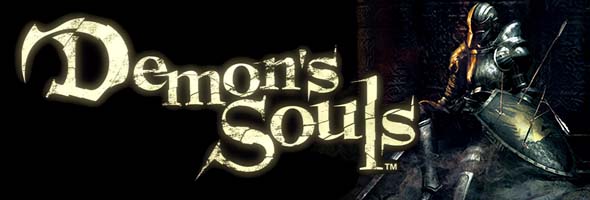
Rumors of a Demon's Souls remaster or remake have been floating around for a while now (as have rumors of a sequel). I have mixed feeling on the idea of a remake/remaster. On the one hand, Demon's Souls is one of my favorite games ever and may represent the peak of the series. Naturally, I want more people to play it and recognize its brilliance.
On the other hand, my fondness for the game means that I am hesitant to allow anyone to modify the game at all. After suffering through the abysmal Silent Hill HD Collection, I have strong reservations about any game remastering. Even the announced remake of Shadow of the Colossus has me on edge.
Matthewmatosis has posted an excellent retrospective look at how the subsequent
Souls games failed to live up to Demon's Souls' brilliance and originality.
Sadly, a remaster would probably mean that the servers for the original game would finally get shut down. But I guess having a replacement would be better than having no Demon's Souls at all...?
So with Dark Souls having come to its end with its Ringed City DLC, I've been thinking a lot lately about what I might want to see in any potential Demon's Souls remake or remaster -- if it were to happen.
Table of Contents
[More]
818fbc94-0834-4de0-9bd0-2664cf9988c8|1|5.0
Tags:Demon's Souls, From Software, Boletaria, remake, remaster, reboot, sequel, boss, soul, Old Monk, online, multiplayer, co-op, PvP, grass, Estus Flask, poise, item burden, equipment burden, crystal lizard

The Kingdom of Kongo was a small, but prosperous kingdom located on the west coast of sub-Saharan Africa. It can trace its origins back to the late 14th century, when Lukeni lua Nimi conquered the city of Mwene Kabunga and renamed it M'banza-Kongo. The city grew rapidly in an otherwise sparsely-populated region, and by the 17th century, it contained about one-fifth of the entire Kongo population (around 100,000 people). It's large population made it a prosperous and wealthy trading hub that eventually attracted the attention of European powers. The Portuguese set up colonies in Kongo territory, where they would set up a Roman Catholic church that would become one of the strongest churches in all of Africa. In 2017, the entire city of M'banza-Kongo was declared a UNESCO World Heritage Site.

In the first half of the 16th century, Kongo was ruled by Mvemba a Nzinga. His father converted to Christianity following the arrival of the Portuguese, and Mvemba a Nzinga added "Afonso" to his name, later becoming known as King Afonso I of Kongo. Afonso played a leading role in Kongo's conversion to Christianity and helped to establish and promote the Roman Catholic Church in the region. The reasoning for his conversion is unclear. Some scholars believe that he was motivated by genuine faith; while others believe that he was only complicit in the conversion in order to facilitate trade with European powers, and possibly to try to spare his population from becoming subject to the Atlantic slave trade. While Kongo had a slave economy of its own, and the kingdom willingly sold slaves to the Europeans, Afonso still denounced the Portuguese as exploiting Kongo's cooperation by kidnapping free Kongo citizens in violation of Kongolese law. The King of Portugal responded by dispatching officers to oversee the slave trade and ensure that only lawful slaves were sold to Europeans, and he demanded additional tribute from Kongo, such as wines and grains.
DISCLAIMER:
Civilization VI is still very early in its life-cycle. Strategies for the game (and for specific leaders and civs) may change as Firaxis applies balance patches, introduces new features, or expands the game through DLC or expansion packs, or as the Civ community discovers new strategies. As such, the following strategy guide may change from time to time. I will try to keep it up-to-date, and will make notations whenever changes are made. I'll also post links in the official 2K forums and CivFanatics, where I'll also report any changes made. If possible and practical, I will try to retain the original content of the strategy for posterity.
I welcome any feedback or suggestions that readers wish to offer. Feel free to post on the linked forums, or by posting a comment at the bottom of the page.
This guide is up to date as of the Summer 2017 patch (ver. 1.0.0.167) (Nubia DLC)
Kongo is a civilization that thrives in jungles and forest, growing massive (and productive) cities. Mvemba a Nzinga adds a unique religious flavor to the civilization by preventing it from being able to found its own religion, while simultaneously wanting other players to send their religion to you.
[More]
d42e1e83-3ee9-4f90-ab44-b8ddd956e2eb|1|5.0
Tags:Sid Meier's Civilization, Civilization VI, Kongo, Kongolese, Mvemba a Nzinga, Afonso I, Nkisi, religious convert, enthusiastic disciple, Ngao Mbeba, Mbanza, neighborhood, housing, appeal, religion, woods, rainforest, art, sculpture, archaeology, relic, artifact, museum, culture, slavery, Atlantic slave trade, unique improvement, unique melee unit, swordsman
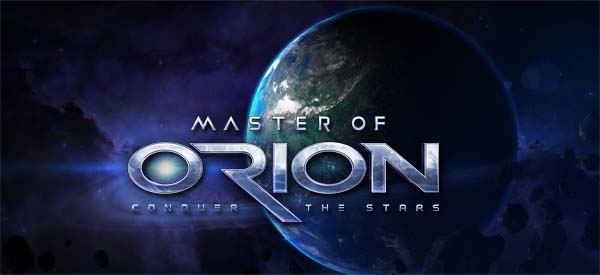
The 2016 reboot of Master of Orion kind of shoots itself in the foot a bit with its own subtitle: "Conquer the Stars". When I play 4x games, I like to feel like I'm really building an empire, managing an economy, and conducting diplomacy. All of those things are present in Master of Orion, but I've gotten a pretty distinct feeling that this is yet another strategy game that falls victim to military rushing being the optimal strategy by far. Master of Orion doesn't really want you to build a civilization and colonize the galaxy; it firmly wants you to do what its subtitle tells you: conquer the stars.
Master of Orion III was kind of shit (it was boring, ugly, and completely lacked personality and substance), but at least it made some effort to be new and interesting. Most noticeably, the galactic map was actually three-dimensional. Sure, this was a navigational and UI nightmare for the human player, but it required players to think differently about how they approached expansion and warfare. At a more fundamental level, MoO3 sought to be a game about macro-management, asking the player to manage a vast galactic empire rather than just a collection of a dozen or so planets. The meat of the game, thus, was intended to be in the mid-to-late stages, as developed empires engaged in epic battles for survival, rather than all the fun and challenge being front-loaded in the early rush to colonize all the nearby planets. It didn't work, but at least it was trying to genuinely innovate the 4x genre.
The new Master of Orion isn't anywhere near that ambitious, and seeks instead to simply bring the original Master of Orion concept (in its simplest form) into the age of high-resolution 3-d graphics. It's a scaled-down, bog-standard space-4x game that borrows heavily from Endless Space and Civilization V. But it is at least a competent one!
Conquer the Stars isn't as big, complex, or ambitious as Master of Orion 3, but at least it's competent.
The galaxy itself isn't very big this time around. Depending on the map's size, there's only a few dozen stars, and most of them only have two or three planets. Unstable star lanes and space monsters can lock you out of exploring certain systems until you research certain technologies or grow your military sufficiently large (respectively). Other than that, exploration is over fairly quickly (especially once you start performing map trades in diplomacy).
Planet-management is also fairly easy. You can assign population meeples between one of three different types of output: food, production, and research. Meeples of different jobs and races have different icons, and unhappy meeples on strike have icons that sit down holding a picket sign. It makes it very easy to see what your population's current status is at a glance. There's just not really much to do with them. You don't have to assign them to work specific buildings, and with only 3 outputs to manage, balancing or specializing isn't that difficult.
All the buildings in the game are also one-time builds that don't serve much function other than to provide flat points of one of the three outputs, or to modify the efficiency of meeples in a particular output category. Buildings that have unique functionality (such as the Spy Center, Gravity Generators, or Interplanetary Administration) are few and far between. The only other thing that you do with your planets is to occasionally terraform them in order to boost your max population and unlock additional slots along each of the output tracks.
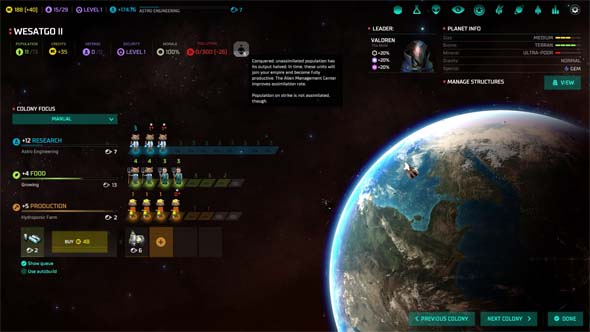
Each point of population is of a specific race, which affects the morale of conquered planets.
The tech tree also feels kind of bland and linear. I would much prefer a tech web along the lines of Civilization: Beyond Earth. Master of Orion kind of goes in this direction a bit by including some techs in which you have to chose which of two different items you want to take when you research certain techs. You can then trade for the other via diplomacy if you want to. It's kind of like the leaf nodes in Beyond Earth, but only some techs have them, and I rarely had to think too hard about which one I wanted... [More]
b529f082-d6e2-4759-8316-2633e3e77143|0|.0
Tags:Master of Orion, Master of Orion: Conquer the Stars, NGD Studios, Wargaming Labs, Steam, strategy, grand strategy, 4x, turn-based strategy, PC, science fiction, space, exploration, expansion, exploitation, extermination, colony, war, Michael Dorn, John de Lancie, Mark Hamill, Alan Tudyk, Nolan North, meeple, Master of Orion 3
|

| 12 | | | | | | | 60 | | 11 | | | | | | | 55 | | 10 | | | | | | | 50 | | 09 | | | | | | | 45 | | 08 | | | | | | | 40 | | 07 | | | | | | | 35 | | 06 | | | | | | | 30 | | 05 | | | | | | | 25 | | 04 | | | | | | | 20 | | 03 | | | | | | | 15 | | 02 | | | | | | | 10 | | 01 | | | | | | | 05 |
|